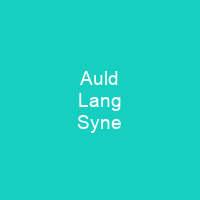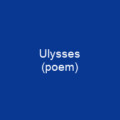Auld Lang Syne is a Scots-language poem written by Robert Burns in 1788. Its traditional use is to bid farewell to the old year at the stroke of midnight on New Year’s Eve. By extension, it is also sung at funerals, graduations, and as a farewell or ending to other occasions.
About Auld Lang Syne in brief
 Auld Lang Syne is a Scots-language poem written by Robert Burns in 1788. It is well known in many countries, especially in the English-speaking world. Its traditional use is to bid farewell to the old year at the stroke of midnight on New Year’s Eve. By extension, it is also sung at funerals, graduations, and as a farewell or ending to other occasions. The song begins by posing a rhetorical question: Is it right that old times be forgotten? The answer is generally interpreted as a call to remember long-standing friendships. Some of the lyrics were indeed collected rather than composed by the poet. Matthew Fitt uses the phrase \”in the days of auld lang syne\” as the equivalent of \”once upon a time\” in his retelling of fairy tales in the Scots language. The last lines of both the first verse and the chorus are often sung with the extra words \”For the sake of\” or \”And days of\”, rather than Burns’ simpler lines. This allows one note for each word, rather than the slight melisma required to fit Burns’ original words to the melody. There is some doubt as to whether the melody used today is the same one Burns originally intended, but it is widely used in Scotland and in the rest of the world.
Auld Lang Syne is a Scots-language poem written by Robert Burns in 1788. It is well known in many countries, especially in the English-speaking world. Its traditional use is to bid farewell to the old year at the stroke of midnight on New Year’s Eve. By extension, it is also sung at funerals, graduations, and as a farewell or ending to other occasions. The song begins by posing a rhetorical question: Is it right that old times be forgotten? The answer is generally interpreted as a call to remember long-standing friendships. Some of the lyrics were indeed collected rather than composed by the poet. Matthew Fitt uses the phrase \”in the days of auld lang syne\” as the equivalent of \”once upon a time\” in his retelling of fairy tales in the Scots language. The last lines of both the first verse and the chorus are often sung with the extra words \”For the sake of\” or \”And days of\”, rather than Burns’ simpler lines. This allows one note for each word, rather than the slight melisma required to fit Burns’ original words to the melody. There is some doubt as to whether the melody used today is the same one Burns originally intended, but it is widely used in Scotland and in the rest of the world.
As Scots emigrated around the world, they took the song with them. The international Scouting movement uses it to close jamborees and other functions. The English version given here keeps the Scots phrase \”auld lang Syne\” rather than translating it as \”long long ago\” or something like that — see the second paragraph of this article for a full explanation of this phrase. The Scots version of the song is as follows: On old long syne my Jo,On old long Syne,That thou canst never once reflect, on old longSyne. Chorus: For auldlangsyne, we’ll tak’ a pint yet, and surely ye’ll be mine! And surely I’ll be your pint-stoup! And there’s a fine hand between us between us, and we’ll hae braid between us. But we’ve wander’d wander, a weary fit, a mony fit, and a tired fit, but we’ll run about the braes, pou’d the gowans;But we’ve wandered a long way. And we’ll walk a long, long way, and there’s no end to it. And surely we’ll come to auld Langsyne. And there’ll be a cup o’ kindness yet, yet, for a long time to come. For a long long time we’ll be together, and I’ll trust you, and you’ll trust me, and it’ll be all right.
You want to know more about Auld Lang Syne?
This page is based on the article Auld Lang Syne published in Wikipedia (as of Jan. 03, 2021) and was automatically summarized using artificial intelligence.







